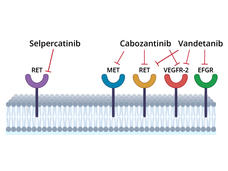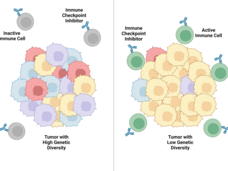November 2023 - Cancer Currents Blog
-
Groundbreaking Trial Results Expand Treatment Options for Some People with Bladder Cancer
For the first time in decades, people with advanced bladder cancer have more effective treatment options. New clinical trial results mark a pivotal moment following years of little progress, bladder cancer experts believe.
-
Molecular Burglary: Cancer Cells Hijack Energy from Immune Cells
A new study shows that, in some tumors, a subset of cancer cells can drain mitochondria, the tiny structures within cells that produce energy, from T cells and use them for their own energy needs.
-
FDA Amends Approval of Pembrolizumab to Treat Stomach and Esophageal Junction Cancer
FDA has changed its 2021 approval of pembrolizumab (Keytruda) along with trastuzumab (Herceptin) and chemotherapy for treating HER2-positive stomach or GEJ cancer. The agency also announced a new approval of pembrolizumab for HER2-negative forms of these same cancers.
-
Selpercatinib Slows Progression of RET-Positive Lung, Medullary Thyroid Cancers
For people with lung cancer and medullary thyroid cancer whose tumors have changes in the RET gene, selpercatinib improved progression-free survival compared with other common treatments, according to new clinical trial results.
-
A Better Biomarker for Cancer Immunotherapy?
A new study, conducted largely in mice, may help explain why a currently used molecular marker—called mismatch repair deficiency—doesn’t always work to predict which patients will respond to immunotherapies called immune checkpoint inhibitors.
-
FDA Authorizes Blood Test for Assessing Risk of Hereditary Cancers
The Food and Drug Administration (FDA) for the first time has granted marketing authorization for a blood test, the Invitae Common Hereditary Cancers Panel. The test detects inherited genetic changes that increase the risk of developing certain cancers.





